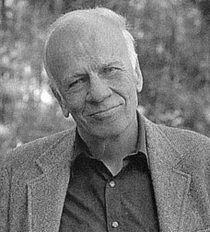MiembroWalkerPercy
- Libros
- 2,284
- Colecciones
- Tu biblioteca (2,284)
- Nubes
- Nube de autores, Espejo de etiquetas
- Medios
- Grupos
- Unido/a
- Feb 11, 2008
- Nombre verdadero
- Walker Percy
- Sobre mi biblioteca
- From The Walker Percy Collection at the Rare Book Collection of the University of North Carolina at Chapel Hill: http://www.lib.unc.edu/rbc/inv/about.php?collection=percy
Note: There are many errors in the online source at Chapel Hill. I did my best to correct them for the LibraryThing version of Dr. Percy's collection. - Sobre mí
- Wiki bio: http://en.wikipedia.org/wiki/Walker_Percy
See also The Walker Percy Project: http://www.ibiblio.org/wpercy/
Laetare Medal Address: http://www.youtube.com/watch?v=T6jaJy3gL2I
(Self-interview) From "Questions They Never Asked Me" by Walker Percy
Q: Would you comment on your own writing?
A: No.
Q: Why not?
A: I can't stand to think about it.
Q: Could you say something about the vocation of writing in general?
A: No.
Q: Nothing?
A: All I can think to say about it is that it is a very obscure activity in which there is usually a considerable element of malice. Like frogging.
Q: Frogging?
A: Yes. Frogging is raising a charley horse on somebody's arm by a skillful blow with a knuckle in exactly the right spot.
Q: What are your hobbies?
A: I don't have any.
Q: What magazines do you read?
A: None.
Q: What are your plans for summer reading?
A: I don't have any.
Q: Do you keep a journal?
A: No.
Q: But don't writers often keep journals?
A: So I understand. But I could never think what to put in a journal…The one time I kept a journal I made two short entries in three weeks: "The only thing notable is that nothing is notable. I wonder if any writer has ever recorded the observation that most time passes and most events occur without notable significance. I am sitting here looking out the window at a tree and wondering why it is that though it is a splendid tree, it is of not much account. It is no good to me. Is it the nature of the human condition or the nature of the age that things are devalued?" …This may be the main function of art in this peculiar age: to reverse the devaluation.
…
Q: How would you describe the place of the writer and artist in American life?
A: Strange.
Q: How do you perceive your place in society?
A: I'm not sure what that means.
Q: Well, in this small Louisiana town, for example.
A: I'm still not sure what you mean. I go to the barbershop to get a haircut and the barber says: "How you doing, Doc?" I say, "Okay." I go the post office to get the mail and the clerk says, "What's up, Doc?" Or I go to a restaurant on Lake Pontchartrain and the waitress says, "What you want, honey?" I say, "Some cold beer and crawfish." She brings me an ice-cold beer and a platter of boiled crawfish that are very good, especially if you suck the heads.
…
Q: Do you regard yourself as a Catholic novelist?
A: Since I am a Catholic and a novelist, it would seem to follow that I am a Catholic novelist.
Q: What kind of Catholic are you?
A: Bad.
Q: No, I mean are you liberal or conservative?
A: I no longer know what those words mean.
Q: Are you a dogmatic Catholic or an open-minded Catholic?
A: I don't know what that means, either. Do you mean, do I believe the dogma that the Catholic Church proposes for belief?
Q: Yes.
A: Yes.
Q. How is such a belief possible in this day and age?
A: What else is there?
Q: What do you mean, what else is there? There is humanism, atheism, agnosticism, Marxism, behaviorism, materialism, Buddhism, Muhammadism, Sufism, astrology, occultism, theosophy.
A: That's what I mean.
Q: To say nothing of Judaism and Protestantism.
A: Well, I would include them along with the Catholic Church in the whole peculiar Jewish-Christian thing.
Q: I don't understand. Would you exclude, for example, scientific humanism as a rational and honorable alternative?
A: Yes.
Q: Why?
A: It's not good enough.
Q: Why not?
A: This life is much too much trouble, far too strange, to arrive at the end of it and then to be asked what you make of it and have to answer "Scientific Humanism." That won't do. A poor show. Life is a mystery, love is a delight. Therefore I take it as axiomatic that one should settle for nothing less than the infinite mystery and the infinite delight, i.e. God. In fact, I demand it. I refuse to settle for anything less. I don't see why anyone should settle for less than Jacob, who actually grabbed aholt of God and wouldn't let go until God identified himself and blessed him.
Q: Grabbed aholt?
A: Louisiana expression.
Actividad reciente
WalkerPercy añadió
Balzac por Stefan Zweig
WalkerPercy añadió
Nana por Emile Zola
Este sitio utiliza cookies para ofrecer nuestros servicios, mejorar el rendimiento, análisis y (si no estás registrado) publicidad. Al usar LibraryThing reconoces que has leído y comprendido nuestros términos de servicio y política de privacidad. El uso del sitio y de los servicios está sujeto a estas políticas y términos.










